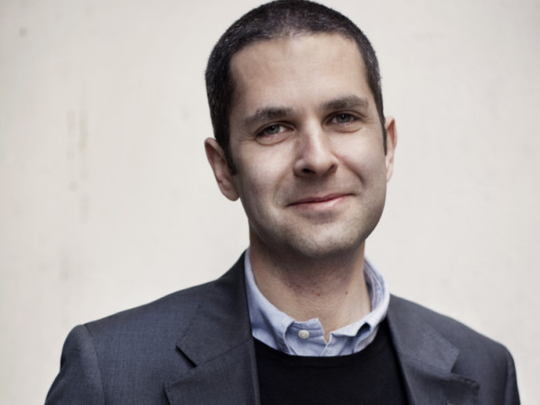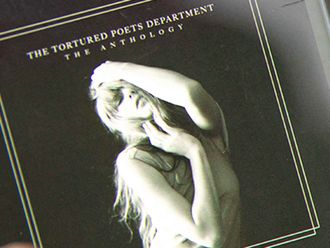
The Rise & Fall of Great Powers
By Tom Rachman,
The Dial Press, 400 pages, $27
For any journalists out there wanting to quit the news business and try something else the story of Tom Rachman may offer some inspiration.
A few years ago the former Associated Press editor and reporter left his job to become a fiction writer. It was something he had been thinking about doing since his early twenties as a student at the University of Toronto. “The reason that I got into journalism in the first place was really in order to gain some experience of the world,” he tells Weekend Review. “To see things and travel so that I can ultimately write fiction.”
Finding the time to write fiction while working as a journalist was hard. “Working at a computer, working with words all the time, after having done that for 12 hours a day it was hard to come home and then sit there and try to write something that was fresh,” he says. “And so I realised I had to leave journalism. I took my savings, I went to Paris and I tried to write a novel.” Initially, it was a frustrating experience. “I couldn’t write anything that was really good,” he says. “But in the process I was learning how to transform from being a journalist to being a novelist.”
After a year had passed he was running short on money, so Rachman took up an editing job at the “International Herald Tribune” under a contract that allowed him to spend 6 months of every year on his writing. His first book, “The Imperfectionists”, was eventually published in 2010. It told the story of a struggling English language newspaper in Rome. Each chapter is told from the perspective of a different character that is in some way associated with the newspaper. The novel “is so good I had to read it twice simply to figure out how he pulled it off” wrote one reviewer for the New York Times. Needless to say it was a big success. The book garnered lots of positive reviews and there are plans to make it into a BBC television series.
Now Rachman is back with his second book, “The Rise and Fall of Great Powers”. The story revolves around a bookseller in her thirties, Tooly Zylberberg, who lives in the Welsh countryside and is trying to understand some mysteries from her past. His book is about expatriates who feel somewhat detached from some of the places they are in. It is an experience Rachman can certainly relate to. He lived in London until he was 7 before his family moved to Canada. Working for the Associated Press he spent time in places such as Sri Lanka, India, Italy and the United States. He moved back to London some years ago.
I interviewed Rachman at a café inside the famous Foyles bookshop on Charing Cross Road in central London. It is afternoon and the place is fairly busy with customers. The bookshop recently moved its flagship store here after closing the old one which was also located nearby. “It is much nicer in design then the previous bookshop,” he tells me. “The previous Foyles was a bit sterile I thought. One thing that is happening — I noticed this on the recent book tour that I was on — is that those bookshops that have survived over the past 10-15 years seem to survive not by having cut prices, and not by having turned themselves into something they are not.
“In fact, the ones that are failing are the chain stores that employed on the cheap people who didn’t know about books, and replaced books with coffee mugs and notebooks,” he says. “The ones that are doing well are ones that hired people who know books; they pay their staff a little more, because they get the staff who are knowledgeable about the field, they organise it all, they have events, they make it a place where they feel like it is worth paying an extra four pounds for this book because they get this wonderful environment.”
While the newspaper industry’s decline was a theme in Rachman’s first novel, the books industry gets some attention in his latest work. For example, the reader learns how there is an increasing trend among visitors to Tooly’s bookshop who only note the ISBN number and prices of books to supposedly purchase them later online. Even Tooly herself considers bookselling a “terminal vocation”. It is a phenomenon which is observable in the real world as well. “I think one doesn’t see the ultimate consequence when these cases are few,” Rachman says. “But if everybody is doing that, or maybe even 25 or 30 per cent of people, it would mean that shop would have to close and then there would actually be nowhere for you to see books except online. So I think many people, when faced with that prospect, would have to rethink their behaviour a bit.”
An interesting (but tricky) technique Rachman employs in the book is spanning the narrative over three decades as the reader travels through Tooly’s life, while juxtaposing different years next to each other. “I am fascinated by the effect that fiction can have — there is a greater degree of clarity looking at changes in people, and also periods than when you are living them. So over the course of the last 20 years of your life there are so many changes that have occurred. It is not like you woke up after 20 years. But it is all so slow and incremental that you absorb these changes and then there is a sense of continuity.”
After writing a very preliminary draft of the book, he travelled to some of the places in the novel. One of them was Thailand. “I was in Bangkok — part of the book is set in this international school in Bangkok. I have never been to an international school. I have been to normal public schools in Canada. So, how would I describe this accurately?”
One of Rachman’s friends was working there and through him he was introduced to a parent whose children go to an international school. “She took me on a tour of this huge school there. I went around talking to some children and asked them what it was like attending the school, if they had any funny stories — about what it was like going to school there, living around the world, their friends leaving and all.”
And did he tell them he was writing a book? “Oh, yeah, I was completely upfront with people,” he says. “I mean the mother of these other children was there showing me around. She gave me a tour and then introduced me to some children who I could talk to. I am always very clear about the purpose because I don’t want to deceive anybody.”
He also spent time in Wales where his novel’s fictional bookshop is located. He went on some of the walks that he imagined his character would go on and took copious notes to describe them.
He tells me about a town which is famous for its bookshops. “I don’t know if you have ever been to this town Hay-on-Wye. Have you heard of it? It is very interesting because this small town is just over the border with England and it is all bookshops. They have a big literary festival there. It is a funny story because the guy who started this phenomenon of all bookshops there is a rather eccentric man. At some point he tried to secede from Britain, declared his own kingdom, just some publicity thing.”
I ask Rachman what he misses about his past life as a journalist. “The opportunity to experience events, meet people I never ever would have otherwise encountered — that is one of the great things about it.” Although he likes the solitary life of a fiction writer, Rachman does at times yearn for the collaborative aspects of journalism. “The fiction takes up so much effort and time that I really don’t get opportunity to do a lot of journalism. But every now and then I do a story.”
One of the things which always struck Rachman when he worked as a journalist were the concerns which preoccupied his colleagues as they covered big stories. “War, famine, disasters, elections, all of the most important events are what you are dealing with every day,” he says. “But what struck me was that people doing those jobs were just like everybody else. As soon as the shift was finished they are thinking why is my bus late? Why can’t I find a nicer girlfriend? What is going to be for dinner? The concerns that these people have and the conversations that they had — and I include myself among them — tended to be much more banal, personal, intimate and human.”
That contrast amused Rachman when he started as a journalist. “I imagined that I would join this international news desk and as soon as the shift would be done everybody would be talking about ‘What about Chirac?’ But it wasn’t really like that at all. Everybody was just saying this Chinese food is terrible.”
Syed Hamad Ali is a writer based in London.








